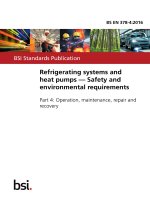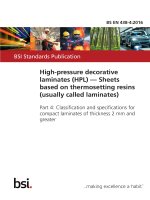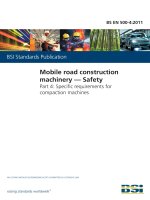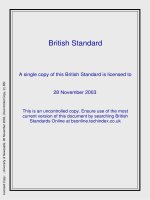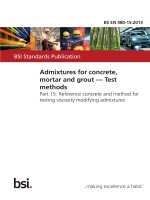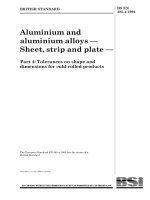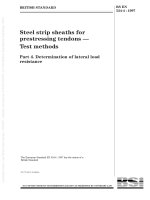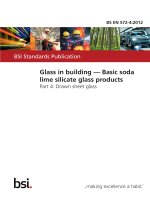Bsi bs en 61499 4 2013
Bạn đang xem bản rút gọn của tài liệu. Xem và tải ngay bản đầy đủ của tài liệu tại đây (1.04 MB, 16 trang )
BS EN 61499-4:2013
BSI Standards Publication
Function blocks
Part 4: Rules for compliance profiles
BRITISH STANDARD
BS EN 61499-4:2013
National foreword
This British Standard is the UK implementation of EN 61499-4:2013. It is
identical to IEC 61499-4:2013. It supersedes BS EN 61499-4:2006 which
will be withdrawn on 06 March 2016.
The UK participation in its preparation was entrusted to Technical Committee
GEL/65, Measurement and control.
A list of organizations represented on this committee can be obtained on
request to its secretary.
This publication does not purport to include all the necessary provisions of a
contract. Users are responsible for its correct application.
© The British Standards Institution 2013
Published by BSI Standards Limited 2013
ISBN 978 0 580 79810 8
ICS 25.040.40
Compliance with a British Standard cannot confer immunity from
legal obligations.
This British Standard was published under the authority of the Standards
Policy and Strategy Committee on 31 May 2013.
Amendments issued since publication
Amd. No.
Date
Text affected
BS EN 61499-4:2013
EUROPEAN STANDARD
EN 61499-4
NORME EUROPÉENNE
EUROPÄISCHE NORM
May 2013
ICS 25.040.40
Supersedes EN 61499-4:2006
English version
Function blocks Part 4: Rules for compliance profiles
(IEC 61499-4:2013)
Blocs fonctionnels Partie 4: Règles pour les profils de
conformité
(CEI 61499-4:2013)
Verteilte Funktionsbausteine für die
Automatisierungstechnik Teil 4: Regeln für normgerechte Profile
(IEC 61499-4:2013)
This European Standard was approved by CENELEC on 2013-03-06. CENELEC members are bound to comply
with the CEN/CENELEC Internal Regulations which stipulate the conditions for giving this European Standard
the status of a national standard without any alteration.
Up-to-date lists and bibliographical references concerning such national standards may be obtained on
application to the CEN-CENELEC Management Centre or to any CENELEC member.
This European Standard exists in three official versions (English, French, German). A version in any other
language made by translation under the responsibility of a CENELEC member into its own language and notified
to the CEN-CENELEC Management Centre has the same status as the official versions.
CENELEC members are the national electrotechnical committees of Austria, Belgium, Bulgaria, Croatia, Cyprus,
the Czech Republic, Denmark, Estonia, Finland, Former Yugoslav Republic of Macedonia, France, Germany,
Greece, Hungary, Iceland, Ireland, Italy, Latvia, Lithuania, Luxembourg, Malta, the Netherlands, Norway, Poland,
Portugal, Romania, Slovakia, Slovenia, Spain, Sweden, Switzerland, Turkey and the United Kingdom.
CENELEC
European Committee for Electrotechnical Standardization
Comité Européen de Normalisation Electrotechnique
Europäisches Komitee für Elektrotechnische Normung
Management Centre: Avenue Marnix 17, B - 1000 Brussels
© 2013 CENELEC -
All rights of exploitation in any form and by any means reserved worldwide for CENELEC members.
Ref. No. EN 61499-4:2013 E
BS EN 61499-4:2013
EN 61499-4:2013
-2-
Foreword
The text of document 65B/854/FDIS, future edition 2 of IEC 61499-4, prepared by SC 65B, "Measurement
and control devices", of IEC TC 65, "Industrial-process measurement, control and automation" was
submitted to the IEC-CENELEC parallel vote and approved by CENELEC as EN 61499-4:2013.
The following dates are fixed:
•
•
latest date by which the document has
to be implemented at national level by
publication of an identical national
standard or by endorsement
latest date by which the national
standards conflicting with the
document have to be withdrawn
(dop)
2013-12-06
(dow)
2016-03-06
This document supersedes EN 61499-4:2006.
EN 61499-4:2013 includes the following significant technical change with respect to EN 61499-4:2006:
Table B.1 has been updated for consistency with Table 8 of EN 61499-1:2013.
Attention is drawn to the possibility that some of the elements of this document may be the subject of
patent rights. CENELEC [and/or CEN] shall not be held responsible for identifying any or all such patent
rights.
Endorsement notice
The text of the International Standard IEC 61499-4:2013 was approved by CENELEC as a European
Standard without any modification.
BS EN 61499-4:2013
EN 61499-4:2013
-3-
Annex ZA
(normative)
Normative references to international publications
with their corresponding European publications
The following documents, in whole or in part, are normatively referenced in this document and are
indispensable for its application. For dated references, only the edition cited applies. For undated
references, the latest edition of the referenced document (including any amendments) applies.
NOTE When an international publication has been modified by common modifications, indicated by (mod), the relevant EN/HD
applies.
Publication
Year
Title
EN/HD
Year
IEC 61499-1
2012
Function blocks Part 1: Architecture
EN 61499-1
2013
IEC 61499-2
2012
Function blocks Part 2: Software requirements
EN 61499-2
2013
ISO/IEC Directives
Part 2
2011
Rules for the structure and drafting of
International Standards
-
-
–2–
BS EN 61499-4:2013
61499-4 © IEC:2013
CONTENTS
1
Scope ............................................................................................................................... 5
2
Normative references ....................................................................................................... 5
3
Terms and definitions ....................................................................................................... 6
4
Contents of compliance profiles ........................................................................................ 7
4.1
4.2
4.3
4.4
4.5
4.6
4.7
Annex A
Structure of compliance profiles .............................................................................. 7
General provisions of a compliance profile .............................................................. 7
4.2.1 Scope .......................................................................................................... 7
4.2.2 References to normative documents ............................................................ 8
4.2.3 Terms and definitions .................................................................................. 8
Portability provisions ............................................................................................... 8
Interoperability provisions........................................................................................ 8
Configurability provisions ........................................................................................ 8
Test requirements ................................................................................................... 8
Annexes .................................................................................................................. 8
(informative) Example compliance profile ................................................................. 9
Annex B (informative) Example device configurability classes .............................................. 10
Bibliography .......................................................................................................................... 11
Figure 1 – Topics addressed by compliance profiles ............................................................... 5
Table 1 – Contents of compliance profiles ............................................................................... 7
Table B.1 – Device configurability classes (informative) ........................................................ 10
BS EN 61499-4:2013
61499-4 © IEC:2013
–5–
FUNCTION BLOCKS –
Part 4: Rules for compliance profiles
1
Scope
This part of IEC 61499 defines rules for the development of compliance profiles, which specify
the features of IEC 61499-1 and 61499-2 to be implemented in order to promote the following
attributes of IEC 61499-based systems, devices and software tools:
•
interoperability of devices from multiple suppliers;
•
portability of software between software tools of multiple suppliers; and
•
configurability of devices from multiple vendors by software tools of multiple suppliers.
These attributes are illustrated in Figure 1.
Software tool 1
portability
configurability
Device 1
Sensor/
Actuator
Link #1
interoperability
Software tool 2
…other tools and devices...
Device 2
Sensor/
Actuator
Link #2
IEC 274/13
NOTE 1 The sensor/actuator links designated #1 and #2 in Figure 1 may be non-interoperable. However, it is
intended that systems complying with a particular profile may show the transfer of events and data from sensors on
one link to actuators on another link using appropriately configured and interconnected service interface function
blocks.
NOTE 2 Compliance profiles may extend their scope beyond that shown in Figure 1 to include interoperability of
sensors and actuators.
NOTE 3 Suppliers of software tools ensure that their products conform to the requirements of IEC 61499-2 as well
as any specific requirements defined in compliance profiles applicable to their particular software tools.
Figure 1 – Topics addressed by compliance profiles
The specification of provisions for the facilitation of device interchangeability is beyond the
scope of this part of IEC 61499.
2
Normative references
The following documents, in whole or in part, are normatively referenced in this document and
are indispensable for its application. For dated references, only the edition cited applies. For
undated references, the latest edition of the referenced document (including any
amendments) applies.
–6–
IEC 61499-1,—
Function blocks – Part 1: Architecture 1
IEC 61499-2,—
Function blocks – Part 2: Software tool requirements 1
ISO/IEC Directives, Part 2:2011,
Standards
3
BS EN 61499-4:2013
61499-4 © IEC:2013
Rules for the structure and drafting of International
Terms and definitions
For the purposes of this document, the terms and definitions given in IEC 61499-1 and
IEC 61499-2, as well as the following, apply.
NOTE 1
Terms defined in this clause are italicized where they appear.
NOTE 2 See also the ISO/AFNOR Dictionary of computer science 2 and the International Electrotechnical
Vocabulary 3 for terms not defined or referenced in this part of IEC 61499.
3.1
comply
comply with a specification
meet all the requirements (of the specification)
3.2
compliance profile
specification complying with the rules given in this part of IEC 61499
3.3
configurability
ability (of a functional unit) to be configured
EXAMPLE The configurability of a device can be expressed by the extent to which it conforms to the
configurability requirements of a compliance profile.
3.4
conform
conform to a specification
satisfy some, but not necessarily all, of the requirements (of the specification)
EXAMPLE A software tool or a device developed to meet some but not necessarily all of the requirements of a
compliance profile is said to "conform to" or to be "conformant with" that compliance profile.
3.5
interoperable
able to operate together to perform a specified set of functions
EXAMPLE Two devices may be considered interoperable if they are able to operate together to perform the
functions specified in a system configuration.
3.6
interchangeable
interchangeable with a functional unit
able to be substituted (for the functional unit)
—————————
1 To be published. Expected publication date: 2013.
2
See Bibliography.
3
See Bibliography.
BS EN 61499-4:2013
61499-4 © IEC:2013
–7–
EXAMPLE A device may be considered interchangeable with another device if it can be substituted for the device
in such a way that any distributed applications will continue to operate as before the substitution, including
identical dynamic responses of any distributed applications involving the device.
3.7
portable
able to be accepted and correctly interpreted by multiple software tools
EXAMPLE A software library element is portable between two software tools if it can be accepted and correctly
interpreted by both software tools.
4
Contents of compliance profiles
4.1
Structure of compliance profiles
The contents of compliance profiles shall follow the general outline given in Table 1. Rules for
the writing of specific clauses and subclauses of such profiles are given in the remainder of
this clause.
The title of a compliance profile shall have the form "IEC 61499 Compliance Profile for <yyy>",
where <yyy> is free text denoting the scope of intended usage of the profile, for example
"Feasibility demonstrations". The title page or a Foreword shall also denote the
organization(s) or individual(s) responsible for the development and maintenance of the
compliance profile.
Compliance profiles may define features not specified in IEC 61499-1 and 61499-2. Such
features shall be described as "extensions to IEC 61499-1" or "extensions to IEC 61499-2"
and the compliance profile shall specify their mapping to the elements described in
IEC 61499-1 or 61499-2, respectively.
Table 1 – Contents of compliance profiles
0. TITLE
0.1 Foreword
1 Scope
2 Normative documents
3 Terms and definitions
4 Portability provisions
5 Interoperability provisions
6 Configurability provisions
7 Test requirements
8 Annexes
4.2
4.2.1
General provisions of a compliance profile
Scope
Clause 1 of a compliance profile shall address the following subjects:
a) the intended usage of the compliance profile;
b) the functional scope addressed by the compliance profile. This may be addressed by a
suitably edited version of Figure 1 accompanied by appropriate text;
c) any additional requirements or restrictions beyond those of IEC 61499-1 and IEC 61499-2
which shall be met within the scope of the compliance profile;
–8–
BS EN 61499-4:2013
61499-4 © IEC:2013
d) any requirements of IEC 61499-1 and IEC 61499-2 that need not be met within the scope
of the compliance profile;
e) provisions of the compliance profile that contradict the normative requirements of
IEC 61499-1 and IEC 61499-2, and the technical reasons for such contradictions.
4.2.2
References to normative documents
Clause 2 of a compliance profile shall follow the rules for normative references given in Part 2
of the ISO/IEC Directives.
4.2.3
Terms and definitions
Clause 3 of a compliance profile shall follow the rules for terms and definitions given in 6.3.1
and Annex D of Part 2 of the ISO/IEC Directives.
4.3
Portability provisions
Clause 4 of a compliance profile shall contain the following information:
•
The extent to which conforming software tools shall be capable of producing library
elements in the syntax and with the semantics defined in Annexes A and B of
IEC 61499-2:2013.
•
The extent to which conforming software tools shall be capable of correctly parsing and
interpreting library elements in the syntax and with the semantics defined in Annexes A
and B of IEC 61499-2:2013.
•
The format of filenames (if any) to be used for the exchange of library elements, for
instance < LibraryElementName > .xml .
4.4
Interoperability provisions
Clause 5 of a compliance profile shall specify the means to be used to meet the requirements
for communication among entities within the functional scope of the compliance profile, for
instance in terms of the semantics of the event and data inputs and outputs of
communication function blocks defined in IEC 61499-1.
The syntax of the event and data inputs and outputs of communication function blocks may,
but are not required to, be used to meet the requirements of this subclause.
4.5
Configurability provisions
Clause 6 of a compliance profile shall specify the means to be implemented by devices and
software tools to achieve configurability of the former by the latter. This may include the
definition of one or more configurability classes for devices.
NOTE
An example of the definition of configurability classes is shown in Annex B.
4.6
Test requirements
Clause 7 of a compliance profile shall specify the tests (if any) to be performed to ensure
compliance with the requirements of the profile.
4.7
Annexes
A compliance profile may contain normative or informative annexes. A normative annex
contains provisions which shall be satisfied by compliant implementations, while an
informative annex shall not contain such provisions. The normative or informative nature of
each Annex shall be made clear by the way in which it is referred to in the text and by an
indication in the profile's table of contents and under the heading of the annex.
BS EN 61499-4:2013
61499-4 © IEC:2013
–9–
Annex A
(informative)
Example compliance profile
An example document used to guide and record the results of an IEC 61499 feasibility
demonstration project undertaken by the Holonic Manufacturing Systems (HMS) Consortium
is available online at To save space, this
document is not included here. Notices of updates to the referenced document will be posted
at />
BS EN 61499-4:2013
61499-4 © IEC:2013
– 10 –
Annex B
(informative)
Example device configurability classes
NOTE The following is an example of suggested wording that could be used in a compliance profile and does not
form a normative provision of this standard.
Types and instances of devices conforming with this compliance profile are specified
according to the rules given in IEC 61499-1.
Devices conforming to this compliance profile are characterized as belonging to one of three
configurability classes, namely:
•
Class 0: Simple devices;
•
Class 1: Simple programmable devices;
•
Class 2: User-reprogrammable devices.
Configurability is specified in terms of the management commands (defined in IEC 61499-1)
to which each type of device can respond, as given in Table B.1.
Table B.1 – Device configurability classes (informative)
CMD a
CREATE
OBJECT
START
STOP
KILL
QUERY
CLASS 1
CLASS 2
type_declaration
Required
fb_type_declaration
Required
fb_instance_definition
connection_definition
DELETE
CLASS 0
Required
Required
Required
Required
Required
data_type_name
Required
fb_type_name
Required
fb_instance_reference
Required
Required
connection_definition
Required
Required
fb_instance_reference
Required
Required
Required
application_name
Required
Required
Required
fb_instance_reference
Required
Required
Required
application_name
Required
Required
Required
Required
Required
fb_instance_reference
all_data_types
Required
Required
Required
all_fb_types
Required
Required
Required
data_type_name
Required
fb_type_name
Required
fb_instance_reference
Required
Required
connection_start_point
Required
Required
application_name
Required
Required
READ
parameter_reference
Required
Required
Required
WRITE
referenced_parameter
Required
Required
Required
RESET
fb_instance_reference
Required
Required
Required
a
The semantics of these commands are defined in IEC 61499-1.
BS EN 61499-4:2013
61499-4 © IEC:2013
– 11 –
Bibliography
ISO/AFNOR,
Dictionary of computer science
IEC 60050 (all parts), International Electrotechnical Vocabulary
/>
_____________
This page deliberately left blank
This page deliberately left blank
NO COPYING WITHOUT BSI PERMISSION EXCEPT AS PERMITTED BY COPYRIGHT LAW
British Standards Institution (BSI)
BSI is the national body responsible for preparing British Standards and other
standards-related publications, information and services.
BSI is incorporated by Royal Charter. British Standards and other standardization
products are published by BSI Standards Limited.
About us
Revisions
We bring together business, industry, government, consumers, innovators
and others to shape their combined experience and expertise into standards
-based solutions.
Our British Standards and other publications are updated by amendment or revision.
The knowledge embodied in our standards has been carefully assembled in
a dependable format and refined through our open consultation process.
Organizations of all sizes and across all sectors choose standards to help
them achieve their goals.
Information on standards
We can provide you with the knowledge that your organization needs
to succeed. Find out more about British Standards by visiting our website at
bsigroup.com/standards or contacting our Customer Services team or
Knowledge Centre.
Buying standards
You can buy and download PDF versions of BSI publications, including British
and adopted European and international standards, through our website at
bsigroup.com/shop, where hard copies can also be purchased.
If you need international and foreign standards from other Standards Development
Organizations, hard copies can be ordered from our Customer Services team.
Subscriptions
Our range of subscription services are designed to make using standards
easier for you. For further information on our subscription products go to
bsigroup.com/subscriptions.
With British Standards Online (BSOL) you’ll have instant access to over 55,000
British and adopted European and international standards from your desktop.
It’s available 24/7 and is refreshed daily so you’ll always be up to date.
You can keep in touch with standards developments and receive substantial
discounts on the purchase price of standards, both in single copy and subscription
format, by becoming a BSI Subscribing Member.
PLUS is an updating service exclusive to BSI Subscribing Members. You will
automatically receive the latest hard copy of your standards when they’re
revised or replaced.
To find out more about becoming a BSI Subscribing Member and the benefits
of membership, please visit bsigroup.com/shop.
With a Multi-User Network Licence (MUNL) you are able to host standards
publications on your intranet. Licences can cover as few or as many users as you
wish. With updates supplied as soon as they’re available, you can be sure your
documentation is current. For further information, email
BSI Group Headquarters
389 Chiswick High Road London W4 4AL UK
We continually improve the quality of our products and services to benefit your
business. If you find an inaccuracy or ambiguity within a British Standard or other
BSI publication please inform the Knowledge Centre.
Copyright
All the data, software and documentation set out in all British Standards and
other BSI publications are the property of and copyrighted by BSI, or some person
or entity that owns copyright in the information used (such as the international
standardization bodies) and has formally licensed such information to BSI for
commercial publication and use. Except as permitted under the Copyright, Designs
and Patents Act 1988 no extract may be reproduced, stored in a retrieval system
or transmitted in any form or by any means – electronic, photocopying, recording
or otherwise – without prior written permission from BSI. Details and advice can
be obtained from the Copyright & Licensing Department.
Useful Contacts:
Customer Services
Tel: +44 845 086 9001
Email (orders):
Email (enquiries):
Subscriptions
Tel: +44 845 086 9001
Email:
Knowledge Centre
Tel: +44 20 8996 7004
Email:
Copyright & Licensing
Tel: +44 20 8996 7070
Email:
